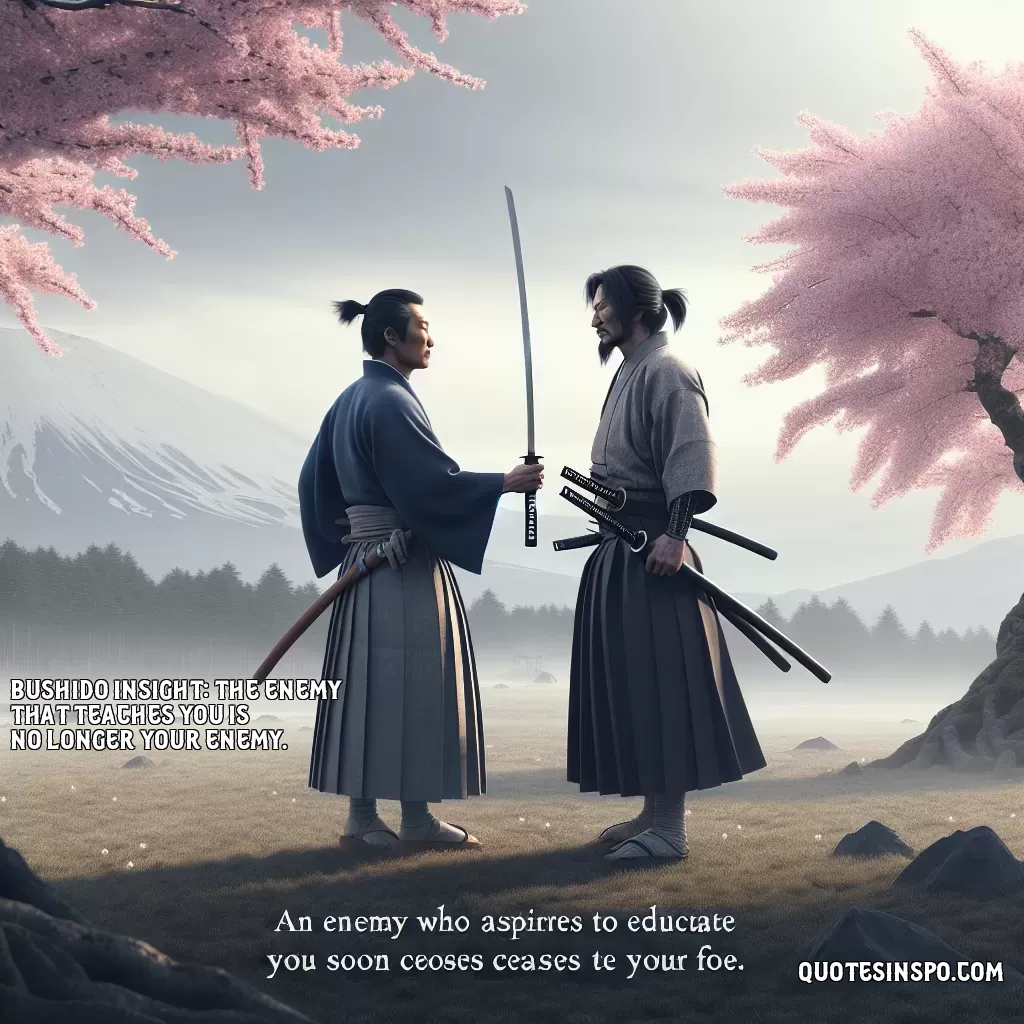
Bushido Insight: The enemy that teaches you is no longer your enemy.
The quote "Bushido Insight: The enemy that teaches you is no longer your enemy" speaks to a profound perspective found in the philosophy of Bushido, the code of moral principles that the samurai of Japan were expected to follow. Bushido emphasizes virtues such as courage, honor, and respect, and this quote reflects the deep wisdom and complexity inherent in the samurai ethos. At its core, the quote suggests that an adversary who imparts valuable lessons ceases to be merely an opponent. It highlights a transformative process where the relationship shifts from antagonism to one of mutual growth and understanding. When an enemy teaches you, whether through deliberate instruction or as a result of the challenge they present, they stimulate personal growth, insight, and improvement. In this sense, the idea is that the knowledge and skills gained from confronting an opponent elevate them from being an adversarial presence to a guiding force. This perspective encourages an open-minded approach to conflict and rivalry, suggesting that challenges can be opportunities for learning and self-betterment rather than mere obstacles to be overcome. By adopting this mindset, one can rise above hostility and aggression, finding a deeper connection to one's own potential for resilience, adaptability, and wisdom. In acknowledging the lessons imparted by our enemies, we broaden our horizons, dissolve animosities, and foster a spirit of continual self-improvement. This transformation reflects the higher aspiration of Bushido: to maintain one's honor and integrity in all interactions, even those with one's foes.
Quote By: K?b? Abe
Kōbō Abe, born on March 7, 1924, in Tokyo, Japan, was a prominent Japanese writer, playwright, and artist, whose works often explore themes of existentialism, identity, and the absurdity of human existence. Abe's upbringing in a post-war Japan influenced much of his literary landscape, as he grappled with the psychological aftermath of conflict and the intricate complexities of modern life.
After graduating from the University of Tokyo in 1952 with a degree in medicine, Kōbō Abe chose to pursue a career in writing, believing that literature could provide a deeper understanding of the human condition. His debut novel, "The Wall," published in 1951, already showcased his unique narrative style and philosophical inquiries, which would become the hallmarks of his later works. Throughout the 1960s and 1970s, Abe gained international acclaim with novels such as "The Woman in the Dunes" and "The Box Man," both of which explore themes of isolation, identity, and the struggles of existence in a rapidly changing world.
Kōbō Abe's writing is often characterized by surreal and poignant imagery, reflecting his fascination with the absurd and the alienation of individuals within society. His works transcend cultural boundaries, attracting readers worldwide. "The Woman in the Dunes," perhaps his most celebrated novel, was adapted into a film directed by Hiroshi Teshigahara, further cementing Abe's status as a significant figure in global literature.
In addition to his novels, Kōbō Abe was an accomplished playwright, with works that challenge traditional narrative forms and reflect his belief in the transformative power of theater. Despite facing initial resistance from the literary establishment, Abe's innovative storytelling earned him several prestigious awards, including the Akutagawa Prize and the Yomiuri Prize.
Kōbō Abe passed away on January 22, 1993, leaving behind a rich legacy as a thinker and a creator. His exploration of the absurdity of life and the complexities of human existence continues to resonate with readers today, establishing him as one of Japan's most significant literary figures of the twentieth century.